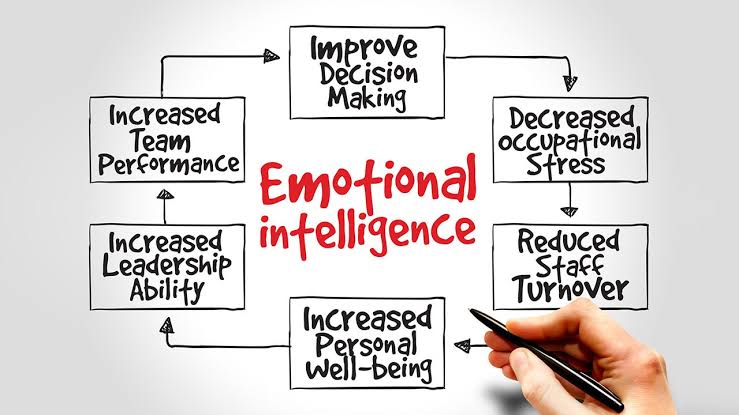In today’s business world, technical skills and strategy are not enough to lead well. By July 2025, emotional intelligence (EI)—the ability to understand and manage your own emotions and those of others—has become a key leadership skill. Leaders with high EI often have better team morale, productivity, conflict handling, and work culture.
While IQ may determine the depth of a leader’s knowledge, it is EQ (emotional quotient) that defines how well they can lead, inspire, and create lasting impact. Emotional intelligence enables leaders to build trust, foster collaboration, and remain composed under pressure. It transforms bosses into mentors and managers into visionaries.
Self-Awareness: The Foundation of Authentic Leadership
At the heart of emotional intelligence is self-awareness—the ability to recognize your own emotions, triggers, and behavioral patterns. Great leaders know how they feel and how those feelings affect their decisions and interactions.
Self-aware leaders:
- Recognize their emotional strengths and weaknesses
- Are honest with themselves about areas for growth
- Respond to challenges instead of reacting impulsively
By consistently reflecting on their motivations and behaviors, these leaders cultivate humility and authenticity, making it easier for others to trust and follow them.
Self-Regulation: Staying Calm and Grounded in Turbulent Times
Leadership is often tested in moments of crisis or rapid change. Emotionally intelligent leaders excel in self-regulation, which allows them to stay calm, collected, and constructive even under intense stress.
Instead of yelling, blaming, or shutting down, they:
- Pause before reacting
- Choose words and actions thoughtfully
- Channel negative energy into problem-solving
This emotional stability not only fosters respect but also sets the tone for the entire team. Employees often mirror the emotional energy of their leaders. A calm leader can prevent panic from spreading and create a culture of thoughtful action.
Motivation: Leading With Passion and Purpose
Another hallmark of emotionally intelligent leadership is intrinsic motivation—a deep commitment to goals that go beyond personal gain. These leaders are driven by purpose, curiosity, and a desire to improve—not just status or power.
They:
- Set meaningful goals for themselves and their teams
- Maintain optimism even when facing setbacks
- Inspire others with their energy and resilience
Because they are internally motivated, they don’t burn out as quickly and are better able to rally others around a shared vision.
Empathy: Understanding and Supporting Others
Empathy is arguably the most essential emotional intelligence trait in leadership. It’s the ability to genuinely understand the feelings, perspectives, and concerns of others. Empathetic leaders listen more than they speak and seek to understand before responding.
Empathy allows leaders to:
- Detect unspoken challenges within a team
- Offer emotional support during difficult times
- Build inclusive environments where everyone feels valued
In 2025, with remote work and global teams becoming the norm, empathy is critical for building connection across distance and diversity. Leaders who fail to develop empathy often struggle with high employee turnover, poor engagement, and lack of innovation.
Social Skills: Building and Sustaining Strong Relationships
Leadership is inherently social. Leaders who excel in social skills can communicate effectively, manage teams harmoniously, and navigate complex workplace dynamics.
They are skilled at:
- Giving and receiving feedback with grace
- Facilitating collaboration and resolving conflict
- Networking and influencing without manipulation
Strong social skills foster psychological safety in teams, which encourages innovation, honesty, and high performance. When people feel heard and respected, they’re more likely to take initiative and stay loyal to their organization.
Conflict Resolution and Team Harmony
Emotionally intelligent leaders don’t avoid conflict—they handle it with skill and fairness. They recognize that disagreements are natural and often necessary for growth. Instead of escalating tensions or ignoring issues, they create open dialogue and find common ground.
By managing conflict constructively, these leaders:
- Prevent resentment from festering
- Strengthen relationships through mutual understanding
- Turn challenges into opportunities for learning
Their teams operate with greater trust and collaboration, leading to more consistent and creative outcomes.
The ROI of Emotional Intelligence in Leadership
Organizations that prioritize emotionally intelligent leadership reap tangible rewards:
- Higher employee engagement: Workers feel respected and understood.
- Improved retention: People stay longer when their leaders genuinely care.
- Better performance: Teams led by emotionally intelligent managers often exceed targets.
- Stronger organizational culture: EI-based leadership fosters inclusion, integrity, and loyalty.
Studies continue to confirm that leaders with high emotional intelligence are more effective at guiding teams through complexity, inspiring innovation, and maintaining sustainable growth.
Cultivating Emotional Intelligence as a Leader
Emotional intelligence isn’t something you’re born with—it’s a skill you can actively develop. Leaders who want to improve their EQ should:
- Practice mindfulness to increase self-awareness and emotional control
- Engage in reflective journaling to understand emotional patterns
- Seek feedback from peers, mentors, and team members
- Learn active listening and hold space for others to share honestly
- Take emotional intelligence assessments to track progress
Continuous learning and humility are crucial. The most effective leaders see emotional intelligence not as a checkbox, but as a lifelong journey of becoming a more empathetic, self-aware, and inspiring human being.
Final Thoughts
In an era where technology is advancing rapidly, it’s emotional intelligence that keeps leadership human. It bridges the gap between strategy and compassion, between direction and understanding.
Whether you’re managing a startup or leading a global team, emotional intelligence is the key to creating lasting influence, not just temporary success. Leaders who lead with empathy, self-awareness, and emotional clarity don’t just command—they connect, uplift, and transform.
And in 2025 and beyond, that’s the kind of leadership the world truly needs.



